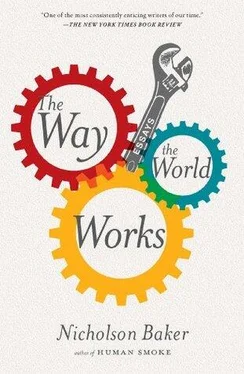Nicholson Baker - The Way the World Works
Здесь есть возможность читать онлайн «Nicholson Baker - The Way the World Works» весь текст электронной книги совершенно бесплатно (целиком полную версию без сокращений). В некоторых случаях можно слушать аудио, скачать через торрент в формате fb2 и присутствует краткое содержание. Год выпуска: 2012, Издательство: Simon & Schuster, Жанр: Публицистика, Критика, на английском языке. Описание произведения, (предисловие) а так же отзывы посетителей доступны на портале библиотеки ЛибКат.
- Название:The Way the World Works
- Автор:
- Издательство:Simon & Schuster
- Жанр:
- Год:2012
- ISBN:нет данных
- Рейтинг книги:4 / 5. Голосов: 1
-
Избранное:Добавить в избранное
- Отзывы:
-
Ваша оценка:
- 80
- 1
- 2
- 3
- 4
- 5
The Way the World Works: краткое содержание, описание и аннотация
Предлагаем к чтению аннотацию, описание, краткое содержание или предисловие (зависит от того, что написал сам автор книги «The Way the World Works»). Если вы не нашли необходимую информацию о книге — напишите в комментариях, мы постараемся отыскать её.
), here assembles his best short pieces from the last fifteen years.
The Way the World Works
OED
Modern Warfare 2
Through all these pieces, many written for
, and
, Baker shines the light of an inexpugnable curiosity.
is a keen-minded, generous-spirited compendium by a modern American master.
The Way the World Works — читать онлайн бесплатно полную книгу (весь текст) целиком
Ниже представлен текст книги, разбитый по страницам. Система сохранения места последней прочитанной страницы, позволяет с удобством читать онлайн бесплатно книгу «The Way the World Works», без необходимости каждый раз заново искать на чём Вы остановились. Поставьте закладку, и сможете в любой момент перейти на страницу, на которой закончили чтение.
Интервал:
Закладка:
One afternoon Bradway gave me a beeper and told me he was going to teach me how to sweep up the pennies in the fountain. Midtown Plaza’s fountain had a fifteen-foot-high inward-curving spray, and there were four or five low mushroom fountains to one side, lit from below; the water went around and under a set of stairs rising up to the mall’s second level. People threw pennies in from the landing on the stairs and while standing at the railing on the second level, but mostly they tossed them in as they walked past. I had thrown in pennies myself. The thing to do when you wished on a penny was to thumb-flip it very high — the more air time it had, the more opportunity it had to become an important penny, a singular good-luck penny — and then watch it plunge into the water and twirl down to the tiled bottom of the pool. You had to memorize where it landed. It was the penny with the two very tarnished pennies just to the left of it — or no, was it one of the ones in that very similar constellation a foot away? Every day you could check on your penny, or the penny you had decided must be your penny, to see how it was doing, whether it was accumulating wish-fulfilling powers.
So when Bradway said that I — a maintenance worker earning $2.50 an hour — was going to be sweeping up all the pennies, I experienced a magisterial shiver. We went down to the basement and got a pair of rubber fly-fishing boots, a black bucket with some holes in it, a dustpan, and a squeegee broom. Bradway showed me the switch that turned off the pump for the fountains. I pressed it. There was a clunk.
Back upstairs the water was almost still. I stepped over the marble ledge and, handed the long pole of the squeegee, I began pushing around other people’s good luck. The bottom of the pool was covered with small blue tiles, and it was somewhat slimy, so that the pennies, moved along by the squeegee, formed planar sheets of copper, arranging themselves to fit into one another’s adjoining curves, until finally a row of pennies would push up, make peaks, and flip back, forming a second layer, and then another layer would form, and eventually there was a sunken reef of loose change — including some nickels and dimes, but no quarters — in one corner of the pool. “That’s it, just keep sweeping them toward the pile,” Bradway said. He gave me the black bucket with the holes in it, and, rolling up my sleeves as high as I could, I used the dustpan to scoop up the change and pour it, entirely underwater, into the bucket. The sound was of anchor chains at the bottom of the sea. By doing as much of it as possible below the surface, we kept the penny removal somewhat discreet.
Bradway went away while I swept farther afield, and I looked out with a haughty but weary look at the people walking by: I was the maintenance man, standing in the water; they were just pedestrians in a mall. “Are you going to keep all that money?” a man said to me. I said no, it was going to charity. “I’m a good charity, man,” he said. The trickiest area to sweep was along the row of mushroom fountains (which were just stalks when the water was turned off), but even there it wasn’t too hard, and when I got the strays out into the open tilework and scooted the change along in a cloud of pale, sluggish dust, I felt like a seasoned cowboy, bringing the herd home.
Bradway came back and together we pulled the black bucket out, letting the water pour from the holes. It was extremely heavy. We set it on a two-wheeled dolly. “Feel that slime?” said Bradway. I nodded. “The bank won’t take the money this way.” We went down the freight elevator to the basement and he showed me a room with an old yellow washing machine in it. Together we dumped the money in and Bradway turned the dial to regular wash; the coins went through a slushy-sounding cycle. After lunch, I scooped out the clean money and wheeled it to the bank. As told, I asked to see Diane. Diane led me back to the vault, and I slid the black bucket off the dolly next to some dirty sacks of quarters.
Every week that summer I cleaned the fountain. Every week there was new money there to sweep up. I flipped more coins in myself; one nickel I deliberately left in place for a few weeks while I maneuvered away all the pennies around it, so that my wish-money would have more time to gather momentum. The next time, though, I swept it along with the rest, trying, however, to follow its progress as a crowd of coins lined up like piglets on the sow of the rubber blade. There were momentary collisions and overturnings, and the wavelets of the water added a confusion. My coin slid over another coin and fell to the right, and then, as I pushed them all into the corner pile, a mass of money avalanched over it and it was lost to view.
Once I came across a penny that had lain in the water under the stairs, unswept, for a very long time — perhaps years. Black it was and full of power. I pushed it into the heap with the others, dumped it into the washing machine, and delivered it to Diane at the bank.
(2001)
How I Met My Wife
She was walking up a flight of stairs in a college dorm; I was carrying my bicycle down the stairs. I could hear the ticking sound of the slowly revolving tire as I introduced myself.
I stood in her room with my hands in my pockets while she did her Italian homework. She sat on the floor, leaning against the bunk bed, wearing clean, wrinkly T-shirts of various colors. She was dissatisfied with her clothes, and she often changed several times a day. She moved her head almost imperceptibly when a song came on that she liked. She didn’t own a bra, though her mother pleaded with her. She liked someone else who lived on the hall; I liked watching her blush when he dropped by. On our first date she wore a wonderful cashmere coat that she had bought at a thrift store. It had a shawl collar made of lambswool that went with her soft, thoughtful lips. I tried to get her to shoe-ski on the thin layer of snow on the sidewalk in front of the administration building, but she didn’t want to. It was snowing big intermittent designer flakes that night. She told me about a kitten she had found in one of the forums in Rome, who grew up to be an enormous, arrogant, affable cat. Once, she said, it fell off the sixth-floor balcony of their apartment in the Piazza Paganica and broke its nose when it landed; its purr was especially loud and resonant after that fall.
(1993)
La Mer
After school, when I was thirteen, my bassoon teacher told me that the Rochester Philharmonic, where he played second bassoon, was rehearsing a piece of music called La Mer. Mer didn’t mean “mother,” he said — it meant “sea,” and the remarkable thing about La Mer was that it really and truly did sound like the sea. He played me some bits from the score while I put together my instrument. What he played didn’t sound like the sea to me, but that wasn’t surprising, because nothing sounds like the sea on the bassoon. A few months later, I bought a record of Pierre Boulez performing La Mer with the New York Philharmonic. I put on the heavy, padded headphones, that were like inflatable life rafts for each ear, and I heard Debussy’s side-slipping water-slopes, with cold spray blown off their crests, and I saw the sudden immensity of the marine horizon that followed the storm, and I was amazed by how true to liquid life it all was. It was just as good as Joseph Conrad’s “Typhoon,” then one of my favorite stories — maybe even better.
Later, after I’d applied to music school, I bought the pocket score of La Mer and tried to figure out how Debussy did it, but the score didn’t help much. What gave Debussy the confidence to pick up half a melody and then flip it away, like a torn piece of seaweed, after a moment’s study? How did he turn an orchestra, a prickly ball of horsehair and old machinery, into something that splashed and surged, lost its balance and regained it? There may be things about La Mer that are slightly dissatisfying — there may be too much of the whole-tone scale in a few places (a novelty then, worn out by cop-show soundtracks now), and Debussy made a mistake, I think, when he revised the brass fanfare out of the ending — but this piece has so many natural wonders that you drive past the drab moments as if they were convenience stores, without paying attention to them, looking out at the tidal prodigies.
Читать дальшеИнтервал:
Закладка:
Похожие книги на «The Way the World Works»
Представляем Вашему вниманию похожие книги на «The Way the World Works» списком для выбора. Мы отобрали схожую по названию и смыслу литературу в надежде предоставить читателям больше вариантов отыскать новые, интересные, ещё непрочитанные произведения.
Обсуждение, отзывы о книге «The Way the World Works» и просто собственные мнения читателей. Оставьте ваши комментарии, напишите, что Вы думаете о произведении, его смысле или главных героях. Укажите что конкретно понравилось, а что нет, и почему Вы так считаете.












